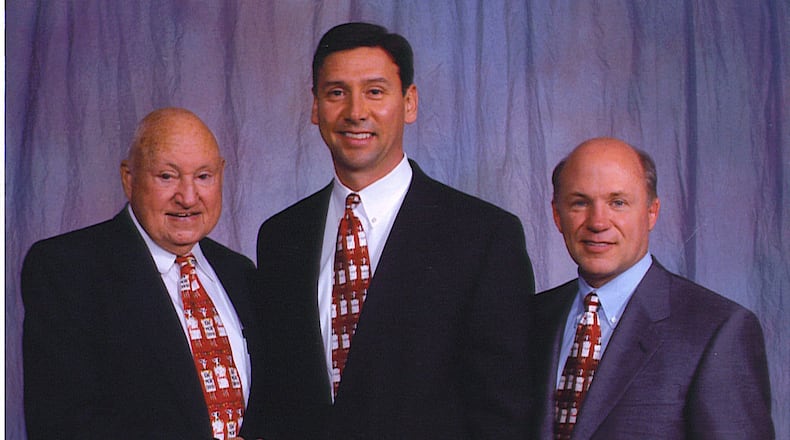Truett Cathy stepped out of The Greenbrier resort’s restorative sulphur bath. He was refreshed, rejuvenated - and naked as Adam on his first day in the Garden of Eden.
The attendant tasked with assisting gentlemen clients explained that the treatment’s final step would be a cleansing blast of warm water.
“You may want to cover your sensitive area,” he delicately advised.
Cathy clapped his hands over his bald head, luxury spa services being unfamiliar to someone who grew up poor in Atlanta and started a restaurant empire in tiny Hapeville. Afterward, he couldn’t wait to regale his colleagues with the anecdote.
"He had the whole room howling with laughter," recalls his former attorney, Perry McGuire, in "Nice, But Not Naive, and Other Lessons I Learned From Chick-fil-A Founder Truett Cathy." "Who has the humility to tell such a story? Someone confident in who they are and who is not afraid to be vulnerable to his friends."
MORE: Chick-fil-A is tops with teens, study finds
Credit: John Spink
Credit: John Spink
The book is dedicated to the late Cathy, who died in 2014 at 93. Proceeds will be donated to the Chick-fil-A Foundation and WinShape Foundation in his memory.
McGuire, now an attorney with Smith, Gambrell & Russell in Atlanta, worked for Cathy and his restaurant chain for 11 years, starting in 1993. Their initial encounter set the tone for their professional and personal relationship.
“The first time I met him was in the lunch line at the corporate headquarters. I was behind Truett in line. The lady behind the counter turned around and said, ‘Hey, Truett,’ then pulled out a container of fried chicken feet,” McGuire said. “I thought, that probably speaks volumes about his upbringing and childhood.”
Named after evangelist George W. Truett, Samuel Truett Cathy was the sixth of seven children. His father was a struggling insurance salesman and his mother made ends meet by renting out beds in their modest home.
“I had a low image of myself because I was brought up in the deep Depression,” Cathy said in a 2008 interview with The Atlanta Journal-Constitution. “I struggled to get through high school. I didn’t get to go to college. But it made me realize you can do anything if you want to bad enough.”
Greenbriar to the Greenbrier
The founder of what would become the nation’s top chicken chain devised the recipe while operating its predecessor, the Dwarf Grill (now Dwarf House). The first Chick-fil-A, all 384 square feet of it, opened 1967 in Atlanta’s Greenbriar Mall. Today there more than 2,200 locations, including stand-alone stores and spots in malls, airports, college campuses and sports facilities.
Its largest venue, a five-floor, 12,000-square-foot structure in Manhattan’s financial district, opened in March. Its first international franchise opens in Toronto in the first half of 2019, with a planned 15 in the greater Toronto area to follow. All Chick-fil-As are closed on Sunday in keeping with Cathy’s Christian beliefs.
By the time McGuire began working as his attorney, Cathy was successful enough to hold corporate events at fancy resorts like West Virginia’s renowned Greenbrier, but remained decidedly humble.
“He drove himself back and forth to the office,” McGuire said. “He knew the price of a gallon of gasoline. He knew the price of a gallon of milk. I don’t think he ever lost touch with the world around him.”
The only time McGuire recalled his client seeming miffed at him was when he placed a call and told the other party to please hold for “Mr. Cathy.” It was just “Truett,” he quickly learned.
He could draw a crowd of admirers, though. McGuire accompanied Cathy to Capitol Hill in 2002 when lawmakers invited his testimony on business ethics amid the Enron debacle. Congress members, even those not on the committee that day, lined up to meet Cathy. He cheerfully handed out Chick-fil-A’s signature stuffed cows and sandwich coupons.
“Nobody ever turns those things away,” McGuire mused.
‘Never outgrew his friends’
Cathy’s entrepreneurial spirit blossomed early, despite his impoverished beginnings. As an 8-year-old with cardboard stuffed in his shoes, he would buy a six-pack of Cokes for a quarter and sell them for a nickel each, clearing a 5-cent profit. Throughout his life he remained diligent about watching expenses but never valued profit over people, McGuire said.
Once, someone suggested the company change one of its vendors to save a little money but Cathy, happy with the vendor and its services, maintained the account.
“His life was very simple. His faith was very simple. His business judgments were very simple,” McGuire said. “He always talked about being a good steward of everything he had.”
Like any good lawyer, McGuire didn’t go into specifics of any of the litigation he dealt with during his time with Chick-fil-A in either his book or the interview about it. Instead, he focused on the lessons his famous client taught him.
“He never outgrew his friends,” he said.
Chick-fil-A remains a private concern helmed by its founder’s descendants. Dan T. Cathy is chairman and CEO and his brother, Bubba Cathy, is executive vice president. Their sister, author and brand ambassador Trudy Cathy White, has served as a restaurant operator and director of WinShape Camps for Girls. They got their start as youngsters performing odd jobs at the Dwarf House.
“Dad would give us each a butter knife so we could scrape the chewing gum and other things from the bottoms of each table. We would do that almost every day,” Dan Cathy says in his company bio. “It was all very glamorous.”
Andrew Cathy, Dan’s son and Truett’s oldest grandchild, is senior vice president and chief people officer.
In 2011, Cathy’s family members and hundreds of friends celebrated his 90th birthday with a black-tie, star-studded bash at the Woodruff Arts Center.
“I consider each one of you my friend, especially those of you who eat at Chick-fil-A!” he said that night. “I’d like to invite you to my 100th birthday, which is coming up 10 years from now.”
McGuire sees his client and friend’s legacy in the continued success of the business and philanthropic efforts he launched. The company awarded $14.5 million in scholarships to more than 5,700 employees through the Chick-fil-A Foundation this year, for example. WinShape programs include WinShape Homes, which serves children in foster care. Working with underprivileged children was a cause dear to Cathy; he’d often become emotional during public speaking engagements when his remarks turned to that area.
“Truett just wanted to take care of kids. Kids who can’t fend for themselves, who have very few options, who are the victims of circumstance and are at the mercy of the state,” McGuire said. “For every public benevolence or contribution he was recognized for there were probably 100 small acts of kindness no one would ever know about. He continually found ways to help people.”
About the Author
Keep Reading
The Latest
Featured





